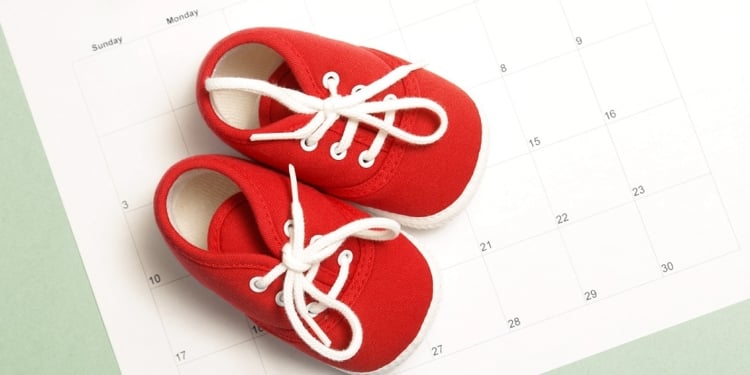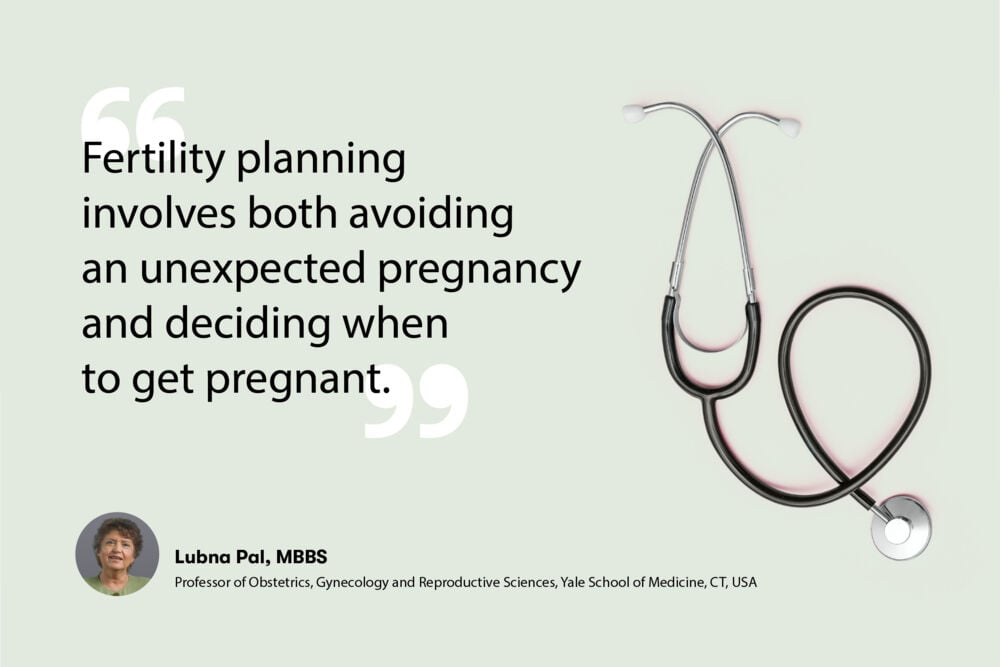If you are thinking about becoming a parent, it is never too soon to start taking healthy steps for you and your baby-to-be. In this article, Dr. Lubna Pal, professor of obstetrics, gynecology, and reproductive sciences, answers some key questions about pregnancy planning.
-
Tracking cycle
-
Getting pregnant
-
Pregnancy
-
Help Center
-
Flo for Partners
-
Anonymous Mode
-
Flo app reviews
-
Flo Premium New
-
Secret Chats New
-
Symptom Checker New
-
Your cycle
-
Health 360°
-
Getting pregnant
-
Pregnancy
-
Being a mom
-
LGBTQ+
-
Quizzes
-
Ovulation calculator
-
hCG calculator
-
Pregnancy test calculator
-
Menstrual cycle calculator
-
Period calculator
-
Implantation calculator
-
Pregnancy weeks to months calculator
-
Pregnancy due date calculator
-
IVF and FET due date calculator
-
Due date calculator by ultrasound
-
Medical Affairs
-
Science & Research
-
Pass It On Project New
-
Privacy Portal
-
Press Center
-
Flo Accuracy
-
Careers
-
Contact Us
I Want to Have a Baby: Fertility Specialist Answers 5 Key Questions About Pregnancy Planning


Every piece of content at Flo Health adheres to the highest editorial standards for language, style, and medical accuracy. To learn what we do to deliver the best health and lifestyle insights to you, check out our content review principles.
Best age to conceive naturally without additional assistance
Fertility experts say that age is a critically important factor that determines the chance of conception and health of pregnancy.
Pregnancies for very young people, teenagers, and older people, especially those 40 and above, can be more difficult.
For instance, as Dr. Lubna Pal explains, teenage pregnancies are more likely to have complications such as preterm birth and preeclampsia, and older parents are much more likely to have issues like preeclampsia and gestational diabetes.
Being too young or too old can affect the chances of becoming pregnant and the health of the future parent and baby. That’s why this information is so important to share.
“As we age, our reproductive chances go down. The shift starts to happen in our mid-30s,” explains Dr. Pal.
Starting around the age of 35, it typically takes a bit longer to get pregnant, the chances of miscarriage increase, and there are more incidents of genetic abnormalities. Keeping this in mind when planning for a pregnancy can be a smart strategy.
It’s important to highlight that these are just average population norms. There are many people who get pregnant in their 40s and have a healthy pregnancy. However, it’s a good idea to have a pregnancy plan in mind before reaching that age.
Age is an important factor for fertility success. It’s also important to put your personal and family history in perspective.
“There are many people who get pregnant in their 40s and have a healthy pregnancy. However, it’s a good idea to have a pregnancy plan in mind before reaching that age.”
Dr. Pal provides a specific example: “If I’m 28 years old, and my mother experienced early menopause (say, in her 30s) or if there is a history of fibroids or endometriosis in my immediate family, I may also be susceptible to gynecological issues that may impact my fertility at an earlier age than the population norms described above.”
Knowing about these potential risks early in your reproductive life can make it easier to begin family planning and provide more options for pregnancy.
Take a quiz
Find out what you can do with our Health Assistant
Importance of planning a pregnancy vs leaving it to chance
According to Dr. Pal, fertility planning involves both avoiding an unexpected pregnancy and deciding when to get pregnant: “The whole point of planning is to optimize one’s chances of achieving a healthy pregnancy in the shortest possible time.”
Unplanned pregnancies and multiple pregnancy terminations, particularly if surgery is involved, have their own risks and can be harmful to your physical and psychological well-being. Planning a pregnancy should consider what’s right for you, recognizing that age is a very important consideration.

Steps for healthy conception
Dr. Pal notes that planning your pregnancy can be easier said than done. Sometimes a person hasn’t found the right partner, or there may be other life factors getting in the way. Family planning can also be more challenging and come with more questions for certain populations, such as same-sex couples and transgender people.
“If my partner and I are both women, we will likely need access to donor sperm to achieve a pregnancy. Regardless of sperm availability, I still need to be aware that my age can and will impact my ability to conceive, and that if possible, I should not delay attempting pregnancy beyond my mid-30s,” explains Dr. Pal.
“If I’m 35 and haven’t found a partner but hope to have a child of my own, I have the option of choosing to freeze my eggs for future use,” Dr. Pal says.
As we can see, there is no single strategy that is right for everyone. But it’s important to be aware that the pace of reproductive aging is much faster than chronological aging.
So what about people who want to get pregnant after 40 naturally? Dr. Pal says that while 40 is still chronologically young, reproductively, the best chances for conception have likely passed, in terms of egg quality as well as quantity.
If someone wants to have a baby but hasn’t found the right partner, they can opt to freeze their eggs for future use or use donor sperm.
“I would not recommend egg freezing in your 20s. But your early 30s can be the time when considering fertility preservation may be worth the cost involved.”
“We, as reproductive specialists, often see single people in their early 40s who seek our assistance for egg freezing,” says Dr. Pal. “Although we can still perform egg freezing, it is important to know that the chances of eggs collected from people in their 40s resulting in a healthy pregnancy are highly reduced compared to eggs frozen at a younger age, preferably under 35.”
Here are some factors to consider when fertility planning:
- Age
- Personal journey
- Personal history
- Life goals
- Access to a partner
- The knowledge of what choices are available
- Financial implications related to those options
From the perspective of fertility planning, Dr. Pal would not recommend egg freezing to a healthy 22-year-old heterosexual single female, as her chances of finding a partner and getting pregnant without any assistance over the next few years might be quite high.
“Chances of successful pregnancy are much higher when you’re young, in your 20s. When you reach your early 30s, haven’t found a partner, and are getting concerned about declining chances of pregnancy with aging, that’s the time when considering fertility preservation may be worth the cost involved,” Dr. Pal suggests.
Knowing when to begin fertility care
By definition, infertility is the inability to conceive despite trying for one year.
However, for people who are 35 or older, that window of time is reduced to six months. Couples who have not been able to conceive despite trying for six months (if the female partner is 35 or older) or 12 months (if the female partner is younger than 35) might consider seeking consultation with a fertility specialist.
However, there are times when it may be a good idea to consult with a fertility specialist sooner. “My perspective as a clinician is that if my patient has an irregular menstrual cycle and is ovulating irregularly, I don’t have to make her wait for one year before I’ll say ‘You need help,’” explains Dr. Pal.
It’s important to be aware of the relationship between the regularity of periods and ovulation timing. Dr. Lubna says, “I see many patients who have been trying, but they are really not aware of the importance of the timing of intercourse to the timing of ovulation.”
The ideal time, if you are trying to conceive, is to aim for intercourse two to three days before ovulation. This way, the sperm has a chance to reach the uterus before ovulation actually happens and has a greater chance of reaching the egg.
If you wait for ovulation before having sex, your chances of success go down slightly. Similarly, if you wait for your body temperature to go up before having sex, the likelihood of fertility becomes very slim. The unfertilized egg is likely dead by the time the body temperature starts to rise due to rising progesterone levels.
“For healthy people, it’s quite normal for it to take up to 12 months of trying before a successful ongoing pregnancy is achieved.”
Dr. Pal suggests the following strategy, depending on your age:
If a young couple (under 35 years old) has been unable to conceive despite one year of trying, it’s probably time to consider seeking assistance.
For older couples, six months of failed attempts is enough. But, regardless of your age, if you have irregular periods or ovulation, there’s no need to wait that long. You can consult with a health care provider about fertility sooner to avoid the stress of not knowing.
For young people under 30 with regular cycles, who don’t smoke or have health problems or a family history of early menopause, endometriosis, or fibroids, it is quite normal for it to take up to 12 months of trying before a successful ongoing pregnancy is achieved. If you’re concerned, then make sure to initiate a conversation with your health care provider.
Smoking and the ability to get pregnant
Whether passive or active, tobacco exposure is harmful to fertility, both to eggs and sperm. Even passive exposure to smoke from a partner, friend, or colleague is harmful to ovarian biology, among other things.
“Furthermore, data has found higher stress levels associated with certain behaviors, including smoking,” Dr. Pal says.
While quitting smoking can also be stressful, and some people smoke to relieve stress, overall, any amount of smoking is harmful for reproductive biology.


Hey, I'm Anique
I started using Flo app to track my period and ovulation because we wanted to have a baby.


The Flo app helped me learn about my body and spot ovulation signs during our conception journey.


I vividly
remember the day
that we switched
Flo into
Pregnancy Mode — it was
such a special
moment.
Real stories, real results
Learn how the Flo app became an amazing cheerleader for us on our conception journey.




